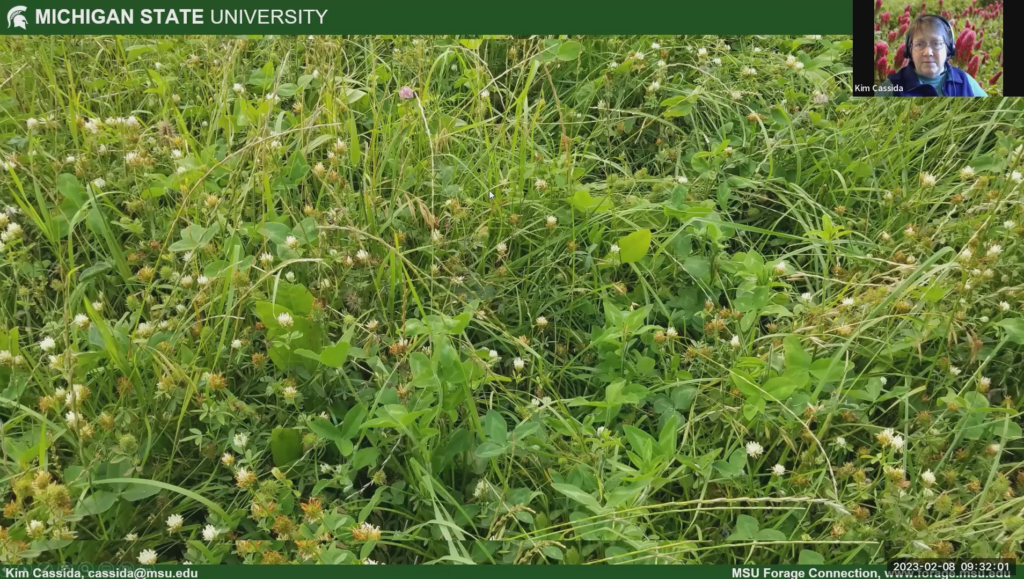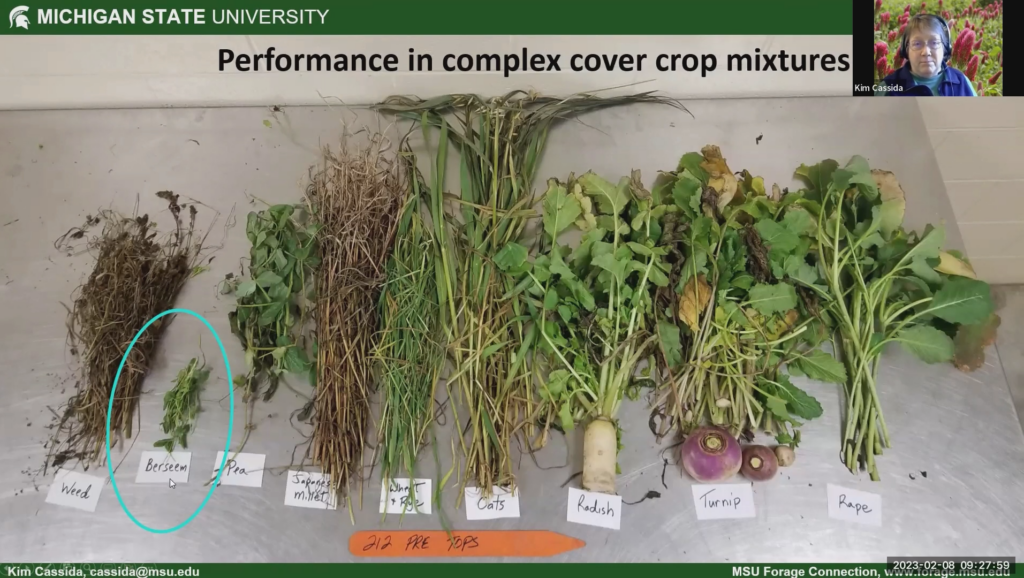On February 8th, the Illinois Cover Crop On-Farm Network (ICCON) was joined by Dr. Kim Cassida, Extension Specialist for Forages and Cover Crops for Michigan State University to discuss Berseem clover. This was the final call in ICCON’s winter series focused on New and Emerging Cover Crops. Dr. Cassida shared her knowledge of Berseem clover based on her research trials comparing annual clovers at Michigan State’s Kellogg Biological Station.
Berseem clover is a cool season annual legume that is native to the eastern Mediterranean region. In the United States, it has seen some popularity for use as a cover crop and for forage. Berseem requires proper placement and management but can be a valuable addition to a cover crop or forage plan for farmers. As a relatively shallow rooted species, it is not well suited to sandy soils or areas that are prone to significant dry spells. Berseem clover prefers heavier and more fertile soils where the pH is near 7. It can also tolerate heavy and wetter soils quite well, and established stands of Berseem clover can withstand multiple forage cuttings or grazing.
From a cover crop perspective, Berseem clover can be attractive for its ability to fix nitrogen in the soil. Berseem clover is not well equipped to re-seed itself due to its seed being softer and less winter hardy compared to other clovers. Through plant breeding, several varieties of Berseem have been developed and winter hardiness has improved.

Dr. Cassida shows establishment of Balansa clover that reseeded in pasture the following year.
Frosty Berseem clover has become the industry standard variety that is now used most commonly. It can withstand winter temperatures down to 5 degrees Fahrenheit or less with sufficient snow cover for insulation. The Frosty variety shows potential for over wintering when used in a seed mix as other species may help improve its ability to handle the cold winter temperatures. Established stands will over-winter better than newly seeded. This means earlier planting dates are critical. Frost seeding into small grains or alfalfa stands seems to work well. Allowing Berseem clover to get established in good growing conditions means more biomass potential.
In Dr. Cassida’s research, she found that spring plantings yielded 1.49-2.82 ton/acre, compared to fall planting that yielded ½ ton per acre. For more information on her research, visit https://forage.msu.edu/publications/. For those looking at forage options, Berseem may be a good fit as it has a higher protein content than alfalfa and carries a low bloat risk when grazed. Pest management of Berseem is similar to other broadleaf covers and forages. Be vigilant for insects such as potato leaf hoppers, aphids, and lygus bugs. Diseases that commonly affect Berseem clover include fusarium, rhizoctonia, sclerotinia, pythium and potentially powdery mildew.

Dr. Kassida shows biomass production of Berseem clover compared to several other cover crop species when used in a complex mix.
Spring or summer planting windows tend to be best for establishment of the stand, and as with most forage crops, it is best to cut or graze before flowering to maximize the regrowth potential. Berseem should be seeded at 8-25lbs of pure live seed per acre at a depth of ¼-1/2”. Frost seeding is possible but only varieties with good winter hardiness should be used in this scenario. Berseem clover utilizes the same rhizobium inoculum as Crimson clover and most seed will be sold pre-inoculated. Berseem can work well in forage mixes but be cautious of getting too many species in a cover crop mix as it does not compete all that well with faster growing brassicas.
ICCON’s New and Emerging Cover Crops Winter Series was produced with support from the Illinois Nutrient Research and Education Council. To learn more about NREC’s work, visit their website at www.illinoisnrec.org
If you are interested in joining the Illinois Cover Crop On-Farm Network to learn about new research and hear from cover crop specialists across the Midwest, you can register for our monthly calls or join our google group by sending an email to hvanbeck@farmland.org.